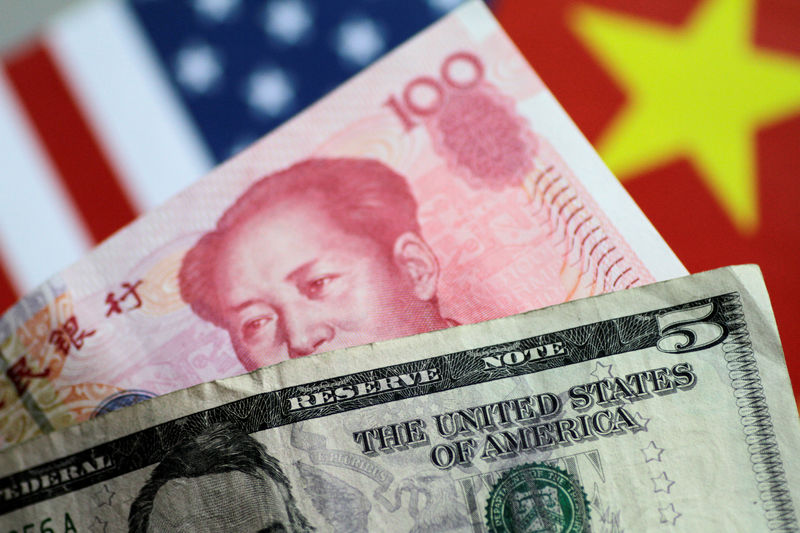By Samuel Shen and Vidya Ranganathan
SHANGHAI/SINGAPORE (Reuters) - Lured by hopes that China's retail investors could become major players in global currency markets, foreign brokers are brazenly chasing business in a gray area of the country's online trading sector, even as Beijing vows to wipe out such activities.
Despite its booming middle-class, household foreign exchange trading in the world's most populous nation has been insignificant, restricted by tight cross-border capital controls and a ban on currency margin trading, in which investors borrow money to trade.
Those curbs, however, have not stopped locals trading currencies online on platforms owned and operated by foreign brokers, which appear to be exploiting regulatory loopholes, notably the fact their systems are based offshore.
In Shanghai last month, Australian firm Cardiff Global Markets pitched its "1,000 people, 1,000 cities" vision, a plan to sign up a million clients to its offshore forex trading platform.
"How much is 1,000 times 1,000? Correct! It's one million," Cardiff's China representative Carl He told a group of brokers to rousing applause at the marketing event, many of whom signed up as local partners.
That exuberance is shared by other firms who are sponsoring local exhibitions, holding lectures on trading skills and cultivating relationships with local businesses.
They are drawn to China by hopes the retail forex community could one day rival the so-called "Mrs Watanabes", the nickname given to Japan's day-traders who emerged as major global currency players in the 1990s.
Javier Paz, founder of advisory firm ForexDatasource.com, says that if deregulated, China's retail forex market would dwarf Japan to become the world's largest, "given the appetite for speculative trading in the population". He estimates Japan has about 7-8 million retail traders, of whom at least 700,000 are active.
Internet use is widespread among China's 1.4 billion people but the retail trading market is minuscule. Forex website fx220.com reckons the country has about 1.5 million currency trading accounts, with only 200,000 active.
Yet, retail forex trading in China each day averaged about $31 billion in 2016, accounting for 6-7 percent of the global market, highlighting the huge potential for growth.
It's a highly profitable but risky business, Paz warns, given local authorities could impose fines, seize computers or even detain local managers.
BRAZEN BETS
Forex margin trading is officially banned in China. Individuals can trade currencies through commercial banks, but without leverage, and there are limits on how much one can buy in a year in China.
Overseas forex brokers, however, have been active in China since the 1980s, offering leverage of up to 400-times, thanks to lax enforcement.
These brokers have helped Chinese citizens move money into overseas bank accounts to trade, often via online currency transactions, according to their product brochures, or even through fake deals, according to salespeople. Brokers that own overseas licenses argue that investor money is safe, internet trading is boundless, and China has no rules banning them from doing business in the country.
But regulatory conditions are changing: China has over the past year intensified already tight scrutiny of outbound capital flows and hunted down some online brokers after a surge of complaints from loss-making investors.
In a statement to Reuters, China's State Administration of Foreign Exchange (SAFE) reiterated that forex margin trading is illegal in China. "The Internet knows no national boundaries, but there must be national boundaries for financial licenses. Cross-border financial service providers cannot operate without a license," China's forex regulator said in the emailed statement.
SAFE said regulators are cleaning up online forex trading platforms and strengthening international regulatory cooperation, having shut down more than 600 illegal forex platforms by the end of 2018.
CAT-AND-MOUSE
While this regulatory sweep has forced some firms to shutter onshore offices, others are less fazed.
FXOpen, a forex trading platform, recently opened a second China office. Others, including CXM Trading and CMS Prime, said they were also looking for ways to tap the market.
Even Chinese firms, such as Citic Securities (SS:600030), Nanhua Futures and carmaker Geely, have entered the market, through acquiring overseas forex trading platforms.
Within China, firms like Cardiff are targeting small cities and counties, seeking to convert stock investors into forex traders.
Mr. Shi, who only gave his family name, is exactly the kind of investor Cardiff seeks.
Based in Yuncheng in eastern Shandong province, Shi was lured into forex trading five years ago by the prospect of quick fortune.
He operates an eight-person trading room and mainly invests in euro and sterling, using technical models with strict rules on cutting losses.
"What matters is not to make big bucks in one bet but to steadily make small profits, without going bust," said Shi.
Shi opened accounts at several offshore forex trading platforms, transferred $50,000 to each account via third-party payment companies, and has traded on a leverage of between 100-400 times his capital.
The risks for firms like Cardiff are growing, however, as China seeks to co-ordinate law enforcement with Australian regulators.
The Australian Securities & Investments Commission (ASIC) said in a statement in April that Chinese authorities had advised that "some online platforms are illegally engaged in forex margin trading activities," and ASIC would not condone brokers who break the law overseas.
But even with more expansive curbs, there are still ways firms can steer clear of authorities.
Some chase Chinese traders with money already parked offshore. Other methods include using multiple licenses, shifting to online marketing, or simply maintaining a low onshore profile.
"It's like cat-and-mouse kind of game and they've been hunted for years," said Audrey Blater, senior analyst at research firm Aite Group.
